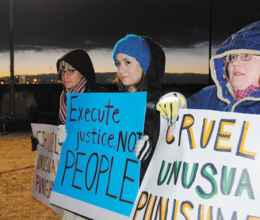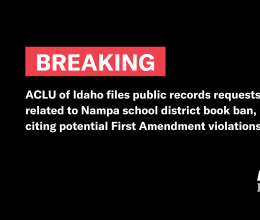
Dear Mayor Bieter and Council Members:
It was just one year ago that the ACLU of Idaho last sent you an open letter, and it was about the same subject as this one: the City’s seemingly persistent push to punish vulnerable families and put veterans and people with disabilities in jail just because of their poverty. Last time, we wrote to warn you that the anti-solicitation ordinance you were then considering was unconstitutional and counterproductive. Fortunately, that ordinance was never enforced, due to a federal court order we helped obtain. Unfortunately, it took expensive litigation and an injunction to protect the civil and human rights of the least among us in Boise.
We should not have to warn the City again that a criminalization approach wastes taxpayers’ money and violates Boiseans’ rights. After all, the City’s own study found that a police and incarceration approach to homelessness costs us all tens of thousands of dollars more per person than a humane, supportive strategy that delivers services and housing to those that need it, rather than court citations and jail time. Boise’s 10 Year Plan to Reduce and Prevent Chronic Homelessness, p. 6 (Nov. 2007), http://hcd.cityofboise.org/homelessness/10year/.
By continuing to criminalize houselessness, the City will also be refusing to heed respected international human rights bodies such as the UN’s Committee on the Elimination of Racial Discrimination, which recently condemned laws like Ordinance 38-14 and called on the United States to withdraw funding from cities, like Boise, that criminalize homelessness. Office of the United Nations High Commissioner for Human Rights, Committee on the Elimination of Racial Discrimination, Concluding observations on the combined seventh to ninth periodic reports of United State of America, pp. 5–6 (Aug. 2014), http://bit.ly/1sR1xVN. The United States Interagency Council on Homelessness, which brings together 19 federal agencies including Veterans Affairs and the departments of Justice, Defense, and Housing and Urban Development, has called on America’s cities to avoid bans on sleeping and camping, finding that ordinances like Boise’s “do nothing to reduce the factors contributing to homelessness” and may violate international human rights laws like the Convention Against Torture. U.S. Interagency Council on Homelessness, Searching out Solutions: Cronstructive Alternatives to the Criminalization of Homelessness, pp. 7–8 (Mar. 2012), http://1.usa.gov/1uwEfVW. That the City of Boise itself has been in costly, pending litigation over these ordinances is no surprise. Sadly too, Mayor Bieter has so far declined to stand alongside his mayoral colleagues in Pocatello and Blackfoot in joining the First Lady’s and National League of Cities’ challenge to end veteran homelessness by 2015 (http://1.usa.gov/ZDFd9G).
If the City is going to make any changes to its camping and disorderly conduct ordinances, it should be to repeal them and ensure that our community’s limited resources are devoted instead to housing first solutions that we know work, and that the City itself acknowledges are “clearly more cost effective, efficient and humane.” Boise’s 10 Year Plan to Reduce and Prevent Chronic Homelessness, p. 3. We hope that this will be the last letter the ACLU of Idaho must write you on this subject.
Sincerely,
Leo Morales
Executive Director
ACLU of Idaho


